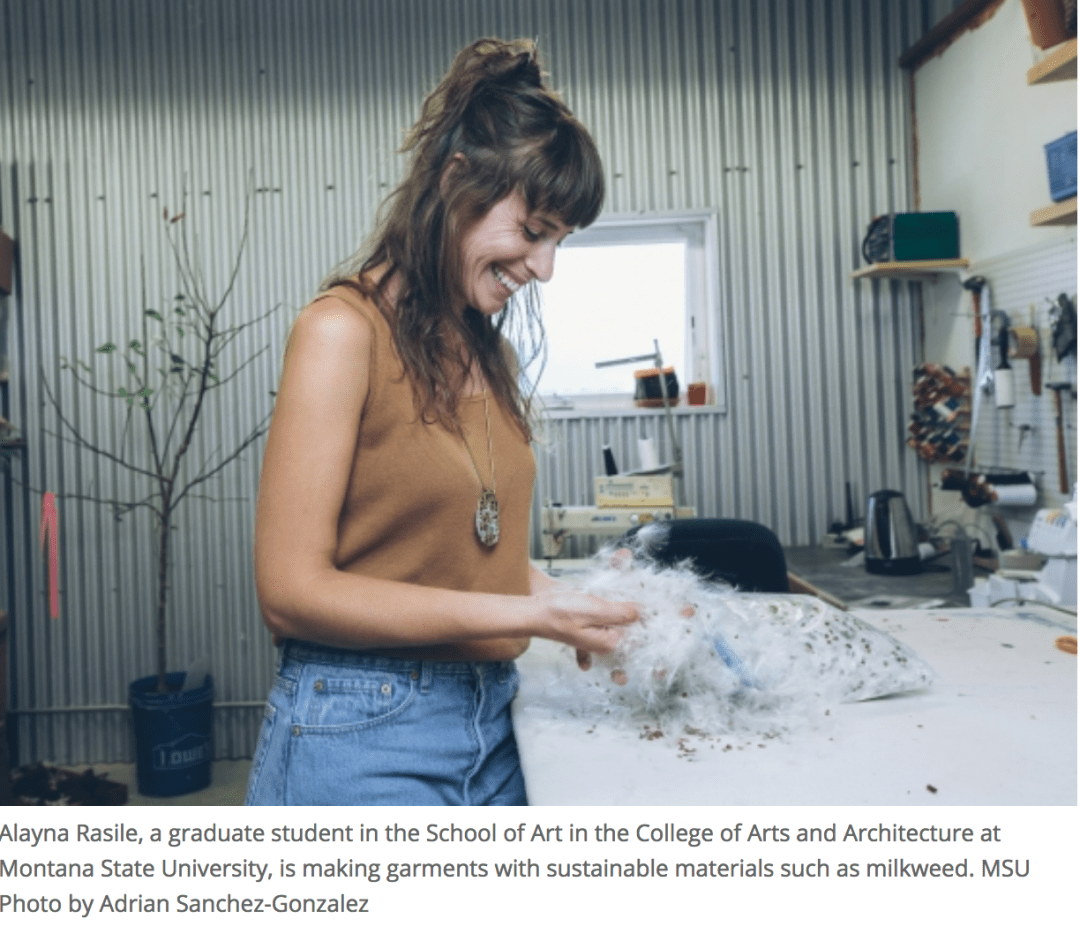MSU student Alayna Rasile from Helena spins beauty from fibers harvested from traditional weed
Alayna Rasile said she has heard all about the lowly milkweed and spirited insistence that it should be banished from gardens.
“I hear that a lot, that people are trying to get rid of it,” said Rasile, a graduate student in the Montana State University School of Art. “But really, it is a very cool plant (that is) essential for the migration of the monarch butterfly.”
The butterflies often lay their eggs on the underside of milkweed leaves, and plant is food for newly hatched larvae. But milkweed is also essential to Rasile’s business, May West designs. She and her collaborator Charlotte X.C. Sullivan, who farms in Vermont, are reviving the use of milkweed floss as a component in sustainable garments.
Collaborating across the country, the two are tapping into some of milkweed’s little-known qualities: The fibers are buoyant, having been used in flotation devices in World War II, and the fibers possess insulating qualities similar to down. They call the age-old plant a “future fiber.”

Rasile, who is a weaver and textile designer, is working on transforming the milkweed floss into a commercially viable fiber while in a three-year program to earn a master of fine arts degree at MSU. The only fiber artist in her program, Rasile is open to what a fine art focus can bring to her work.
It is that openness that has helped Rasile evolve from a scientist to an artist and businesswoman. A native of Helena, Rasile graduated from the University of Oregon with a degree in geography. She worked in archaeology in Washington, D.C., in design in Philadelphia and eventually moved to New York City, where she got a job with a professional quilt maker who quilts maps.
“That was the gateway for me to become a textile artist,” Rasile said.
She was accepted into a yearlong residency at New York’s Textile Arts Center, which she said solidified her interest in textiles, and in 2015 Sullivan came to her to see about using milkweed as a fiber.
“We were completely taken by the silky milkweed fluff,” she said. “We were interested in what we could do with it.” Rasile spun the fiber into a thread, which they then wrapped around a rock that they dropped into water — “And we found the magical quality of flotation,” Rasile said. That experiment the pair to establish the three pillars of their milkweed-based design studio: flotation, migration and thermal regulation.
Rasile said that milkweed, which supports the monarch by providing its only food and habitat throughout its lifecycle, is most abundant in the Midwest. But sprawling development and herbicide use has made the plant scarce, which puts the monarchs at risk, she said.
“It takes four generations of butterflies to migrate from along its flyway from Canada to Mexico, so habitat must flourish along that flyway,” Rasile said, explaining why the International Union for the Conservation of Nature has classified the butterfly as “severely threatened.” She said she hopes companies such as hers would make milkweed commercially viable and therefore more widely grown, which would benefit the monarch butterfly.
Rasile said that Montana is “not in the thick” of milkweed habitat. It is also not in the center of textile or fashion innovation. “But my heart is in Montana,” she said, so she applied to MSU’s MFA program, and she has included a fine arts component to her work in sustainable fibers.
“I come at it from a conceptual angle,” she said of her scholastic work.
Sara Mast, MSU professor of art and one of Rasile’s mentors, said that Rasile’s broad interdisciplinary background and her passion for making a significant social contribution with her work is innovative.
“This distinctive ‘artscience’ project, one of her many engaging endeavors, is a model for what is possible when art, design and fashion are integrated with a strong environmental ethic,” Mast said.
MSU has also helped support her work at May West. Rasile received a Blackstone LaunchPad micro-grant for $1,000, which was matched by a grant from the Vermont Fiber Works. Rasile said the grants will let the company hire a professional pattern maker and have a sample made.
“Those little grants have made a huge difference for us,” said Rasile, who said that processing of the fiber is currently done by hand. She said the company’s goal is to develop a jacket that will be free of microplastics and will be similar in cost and thermal qualities to many popular outdoor down jackets.
“These will be values-driven products,” she said. “It is really future-focused.”
Rasile’s other project is Absorka, a clothing line developed from vintage and reclaimed materials sold at Wilder Goods at the Emerson and the Cactus Blossom Collective in Livingston. And, she is building a cabin in Helena that she hopes to use as an art studio.
“I have a lot of ideas,” she said.